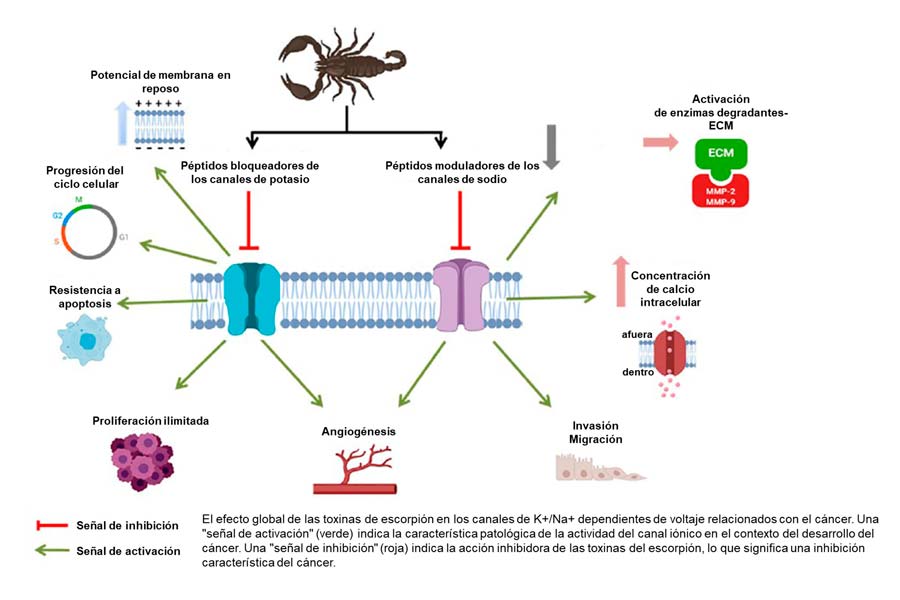Blue scorpion venom will be the main agent used by Tec de Monterrey specialists to develop an adjuvant therapy against diseases like cancer, as well as to scientifically validate its use.
“One of the properties of blue scorpion venom is that it’s rich in a mixture of proteins and peptides, which are said to have beneficial attributes,” explained Jorge Luis Díaz, one of the Tec members involved in the project.
This study by the Tec’s School of Engineering and Sciences and School of Medicine and Health Sciences will be conducted in collaboration with LIFESCOZUL, a company with presence in several countries across the Americas that specializes in studying the venom of this species, which is native to Cuba.
“This venom has been used as a natural remedy against cancer. However, they want to work up a deep scientific background and that’s why we’ve partnered with them, since we want to complement and contribute to this research,” said Díaz.

Working on this research alongside Jorge Luis Díaz Gómez, a full professor of Biomedicine and Technology, will be Dr. Fabiola Castorena Torres, a research professor at the School of Medicine and Health Sciences. These two will be in charge of working on this project.
Joining them are Dr. Silverio García Lara, research professor and Head of the Nutriomics research group’s AgroBio unit, and Dr. César Puente, Academic Exploration Director of Bioengineering and Chemical Processes.
“This venom has been used as a natural remedy against cancer. However, they want to work up a deep scientific background.” - Jorge Luis Díaz
How they’ll analyze the blue scorpion venom
As part of this partnership between Tecnológico de Monterrey and LIFESCOZUL, a number of laboratory tests will be carried out to strengthen the scientific evidence for this project.
“Firstly, the Biotechnology Center at the School of Engineering and Science will be in charge of analyzing this molecule and validating its status as a treatment.
“Subsequently, we’ll move on to a preclinical evaluation phase at the School of Medicine and Health Sciences,” said César Puente.
However, in order to reach the preclinical trial stage, we must first evaluate the toxic effects of the molecules and then assess their therapeutic potential.
“We’re going to validate the efficacy and toxicity of these molecules through in vitro systems, i.e., in cells, and then we’re going to evaluate the efficacy and toxicity through in vivo models in rodents,” explained Dr. Fabiola Castorena.
She added that these tests will be able to demonstrate the effect of this molecule on healthy cells and cancer cells.
“These peptides are a therapeutic source of very precise active molecules that, unlike other molecules, we can identify and synthesize. This allows us to take a giant leap forward in terms of pharmaceutical application,” added Silverio García.
“The Biotechnology Center at the School of Engineering and Science will be in charge of analyzing this molecule and validating its status as a treatment.”- César Puente
Validating its therapeutic effects
Another of the objectives which this research team is focusing on has to do with studying active biomolecules and searching for their different therapeutic effects, said Silverio García.
“There’s a well-known global trend to search for alternative therapies to mitigate against some of the treatments that are normally very aggressive in treating chronic-degenerative diseases.
“From the technical-scientific point of view, it is now possible to reconcile the use of natural sources in the discovery of new drugs of natural origin,” he noted.

“It’s important to clarify that this isn’t a natural remedy, it’s an adjuvant therapy for these diseases.” - Silverio García
The specialist added that peptides aren’t new molecules, they’re the pillars from which every protein we possess are built.
“Once these molecules enter our bodies, they unfold and form these famous peptides, which are no more than a chain of 100 amino acids. They have various effects, which include neurological effects, arterial pressure regulation, and therapeutic effects on the control of these diseases,” he said.
It was Dr. Jorge Luis Gómez who began the search for these new biopeptides in traditional plants such as corn. They’ll now be transferring that experience to analyzing blue scorpion venom.
“The work carried out by both Dr. Jorge and Dr. Fabiola has allowed us to move this model to any other natural alternative source.
“It’s important to clarify that this isn’t a natural remedy, it’s an adjuvant therapy for these diseases. To take it to the pharmaceutical level, we have to gather a lot of scientific information,” acknowledged the researcher.
Strengthening the relationship between institutions
“The fact that Tec de Monterrey can team up with companies in order to solve real-world problems gives us a very strong institutional commitment,” said César Puente.
This partnership will take shape with the signing of an agreement between both institutions that will benefit the development of new methods, alternatives, and solutions to problems such as chronic-degenerative diseases.
“We aren’t saying we’re going to find the answer to cancer, but we’re going to contribute to the treatment of all these people.
“Our commitment is to health at a national and international level, since we wouldn’t just be helping colleagues in Mexico, but also all those who are in Central and South America,” he emphasized.
ALSO READ:





